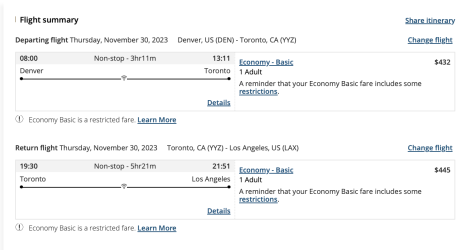kangarooflyer88
Established Member
- Joined
- May 29, 2021
- Posts
- 4,607
- Qantas
- Gold
- Virgin
- Silver
- Oneworld
- Sapphire
- Star Alliance
- Gold
Good to see someone managed to get a request approved on the wide body morning service to PER. Although one must wonder whether QF9 would have been the better option on account of it providing an international standard of service (as it's continuing on to LHR), a better aircraft (787 versus A330). Most importantly, since it is a long haul international service, less likely to be cancelled (lest they cop EU261/UK261). Also since it's later in the day more options to catch it as a connecting flight versus a flight earlier in the day. Only downside is from my experience it may be difficult to secure over the phone.Figure this doesn't need its own thread - a few weeks ago I requested 2*X award seats for some relatives on a short flight connecting to an a330 mel-per in U seats through to Perth. Request approved.
And that's the best case scenario!But it was not meant to be. 24 hours out, they discovered that they had been moved to economy, likely due to cabin size with the aircraft downguaged.
If they were monitoring the connection and realized it was going pear shaped one would hope that the airline would find a solution as close to the original as possible. Then again, you didn't purchase them a flight departing at a certain time, but rather a bundle of rights. Even then one would expect that purchasing a Qantas bundle of rights doesn't result in a JetStar bundle of rights when push comes to shove.Two hours later they received a notification that their inbound was delayed and "Qantas is monitoring the connection". The initial X flight was to be 40 minutes delayed, meaning a 5 minute connection in MEL. Unlikely to work.
Shortly after, notifications arrived and they discovered they had been rebooked onto JQ, departing Melbourne 11pm and arriving to Perth just after midnight.
If I was you (and by the way I am not you), I would have called QF and asked them to be rebooked on QF9 to PER. My understanding is that during IRROPs QF has way more latitude in terms of what to rebook you on. There doesn't need to be classic award availability but simply availability in the cabin you are booked.So after looking forward to the bed in the sky and the J lounge in Mel they had been moved to Jetstar and a post midnight departure, with a 4-5 hour stopover to boot.
You should ask for points as a gesture of goodwill. First your parents did not get the cabin they were originally booked into. Second their travel was impacted by QF's own doing. Third, you'll likely have to chase QFF down for the difference in points. I'd wait a week or two to let the dust settle then send a thoughtful email to customer service.I managed to call QF and get them on a different routing in economy - nothing was showing online but other flights were available for sale. There was an option available for sale in business but at this point the agent (think Fiji, got through straight away, call done in 11 minutes) wasn't aware this was originally a U ticket, and given it would be 737 anyway, the relatives felt the difference between economy wasn't worth the points.
When hanging up I asked the agent to please investigate and chase a refund of the points difference between the original and final booking. I was about to board a different flight so had to disconnect, but they said they'd look into it. I will monitor this over the next few weeks and see if any refunds come through. If not, in addition to the refund, would compensation be a reasonable request?
In terms of how many points to request, I'll leave that up to the forum, but I would think at a minimum 10% of the redemption cost seems reasonable.
The process for that is emailing the QFF address and then calling 2 weeks later if you don't hear back.Due to them holding PC, I'll recommend them claiming ORC due to the downgrade as well.















